We have written before about Gen. Dwight D. Eisenhower’s skill at handling the press and how it served to smooth the way for him throughout his tenure as Supreme Allied Commander. Of course, rifts occasionally opened in the mutually respectful relationship, and the Battle of the Bulge brought one of them to light.
On the morning of Dec. 20, 1944, Eisenhower had transferred temporary command of the U.S. First Army and Ninth Army to British Field Marshal Sir Bernard Montgomery. Operating on the north side of the “bulge” in Allied lines, Gen. Courtney Hodges’ First Army and Gen. William Simpson’s Ninth Army had seen their communications with their superior, Gen. Omar Bradley, cut off, leaving them without a clear picture of the overall situation.
It was a significant move, and correspondents in the theater learned of the change soon after, but a news blackout imposed by SHAEF once the scope of the German counteroffensive became clear prevented anyone from publishing a story about the move. For a time, anyway.
On Dec. 27, Time magazine correspondent James R. Shepley flew from Paris back to New York. Upon his return, he filed a dispatch about the European situation that included a sentence about the command change. It cleared censorship in the U.S. and appeared in print the first week of January 1945 — but public relations officials still refused to allow reporters in Europe to release the full story.
Correspondents aired their grievances to SHAEF public relations chief Brig. Gen. Frank A. Allen the morning of Jan. 5, to no avail, before he finally relented later in the day and released a one-sentence statement confirming the news. “The official disclosure,” read a United Press dispatch, was “made after bitter protests from war correspondents who have not been permitted to report the command change previously.”
UP moved a full story that day about the uproar among the press, though not many papers used it. It began this way:
“Indignation of American war correspondents at the Supreme Allied Headquarters press policy boiled over today both at SHAEF and at the front with charges that SHAEF policy is giving the American public a distorted and confused picture of the situation.”
The Guardian echoed that sentiment from the British side, noting that rumors of a change already had swept through the ranks and in fact been hinted at by German radio as official spokesmen had stayed silent.
The forthcoming official inquiry into how the news had leaked was important, the paper’s military correspondent at SHAEF wrote on Jan. 5, “but far more important is the fact that at last it is possible to use truth to undo something of the political harm that has been done in the past fortnight by ill-informed or half-informed rumour that the command over some American troops has been taken from an American general and given to Field Marshal Montgomery.”
Now that the news was out, though, the switch generated headlines on both sides of the Atlantic.
“MONTGOMERY LEADS YANKS” blared the front page of the Boston Evening Globe’s Jan. 5 editions, while the Pasadena Star-News headline stretched over all eight columns of page one: “Montgomery Directing 2 U.S. Armies.”

While Montgomery, the hero of Alamein, certainly was a known quantity in the U.S., American news outlets nonetheless rushed into print quick-turn profiles of the man who was now commanding some U.S. troops. Wes Gallagher’s version hit the Associated Press wire Jan. 5 and included plenty of praise for Montgomery, though it referred to him in the second paragraph as “the cocky little field marshal who won his reputation in the Libyan campaign.”
In his New York Times analysis of the move that ran Jan. 6, Drew Middleton pushed back on recent British suggestions that Montgomery be named “deputy commander” to Eisenhower in the theater, elevating him permanently above Bradley rather than allowing the two generals to continue as equals in the chain of command.
“Marshal Montgomery is a tactician rather than a strategist, a soldier who has shown great ability as command, first of an army, then of an army group, but who has not the temperament to assume the role of deputy to General Eisenhower,” Middleton wrote. “… Anyone who knows the marshal and understands his approach to a problem of command cannot conceive of his being happy or successful as deputy ground commander.”
The following day, Jan. 7, Montgomery held a press conference at his headquarters in Belgium, lecturing without notes for an hour on the Allied response to the German attack. While he spent abundant time praising Eisenhower and the American troops on the ground, many were left with the impression that Montgomery believed he had saved the day.
Indeed, speaking before the House of Commons on Jan. 18, Prime Minister Winston Churchill pointedly framed the Allied triumph in the Battle of the Bulge this way:
“Care must be taken in telling our proud tale not to claim for the British Army an undue share what is undoubtedly the greatest American battle of the war, and will, I believe, be regarded as an ever-famous American victory.”





There is a massive problem here. ‘ many were left with the impression that Montgomery believed he had saved the day’. Who were these ‘many’? Why were they left with that impression? If you bother to read the script of Monty’s briefing, there is nothing in there to suggest this. Monty set out to support Eisenhower, who he knew was being criticised in the British press, and to get the British press back in line. He was incredibly complimentary about the American troops and their commanders. The US press (back in the States) reported favourably.
So, why did this come to be seen negatively? Certainly, Bradley was very upset about US forces on the north of the Bulge being put under Monty’s command - though this was the most sensible move, given Bradley’s poor communications with Hodges, etc, under those circumstances. Moreover, German propaganda did stir the business up somewhat (see https://blog.nationalarchives.gov.uk/how-nazi-fake-news-split-allied-commanders-in-1945/). While Monty was not ‘good’ at expressing himself diplomatically, as I say, the US press reported favourably. I suspect that Bradley was going to be offended, no matter what Monty said. However, there is simply no evidence that he claimed, or sought to claim, that he had saved the day.